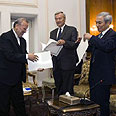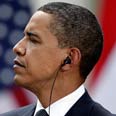
Iranian FM Motakki presents proposals
Photo: Reuters

Wants good-faith talks. Obama
Photo: AP
Iran presents proposals as West ups nuclear pressure
Just hours after US says Islamic Republic moving closer to being able to make atomic bombs by stockpiling enriched uranium, Tehran hands world powers package of proposals that it says address 'various global issues' and represent 'new opportunity for talks and cooperation'
Iran handed a package of proposals to world powers on Wednesday, as it came under renewed Western pressure to swiftly engage in "meaningful" talks to resolve the dispute over its nuclear program.
Stockpiling Uranium
United States said Iran nearing ability to make bombs by stockpiling enriched uranium, urges Tehran to engage in talks on its nuclear ambitions
Tehran says its proposals address "various global issues" and represent a "new opportunity for talks and cooperation". But it was not clear what the proposals were and whether they would be enough to avert the threat of further sanctions on Iran.
Hours before the package was handed to representatives of world powers in Iran, the United States said the Islamic Republic was moving closer to being able to make atomic bombs by stockpiling enriched uranium.
"We have serious concerns that Iran is deliberately attempting, at a minimum, to preserve a nuclear weapons option," US envoy Glyn Davies told a meeting of the 35-nation governing board of the International Atomic Energy Agency (IAEA).
"Iran is now either very near or in possession already of sufficient low-enriched uranium to produce one nuclear weapon if the decision were made to further enrich it to weapons-grade," Davies said at the Vienna-based UN nuclear watchdog body.
Iran, the world's fifth-largest crude exporter, says its nuclear program is aimed at producing electricity and has repeatedly rejected demands to halt enrichment, which can have both civilian and military purposes.
IAEA Director-General Mohamed ElBaradei said his non-proliferation inspectors had "serious concerns, but we are not in a state of panic.
"That is because we have not seen diversion of nuclear material (from declared civilian uses), we have not seen components of nuclear weapons. We do not have any information to that effect," he said.
But Davies' remark pointed to growing Western disquiet about Iran's nuclear advances, largely out of sight due to the restrictions Iran has placed on UN inspections.
ElBaradei said intelligence material suggesting Iran had illicitly studied how to assemble nuclear arms was serious and Tehran must address it, not just issue unsubstantiated denials.
"If this information is real, there is a high probability that nuclear weaponization activities took place (in Iran)."
'Make use of the window of opportunity'
Iranian President Mahmoud Ahmadinejad said on Monday Iran was ready for dialogue on problems and challenges facing the world but insisted it would not back down in the nuclear issue.
Ahmadinejad has already snubbed US President Barack Obama's end-September deadline to talk to the major powers on Iran's nuclear work, saying discussion on the issue was "finished" and Tehran would not negotiate on its "rights".
Iran was ready to negotiate and cooperate on making "peaceful use of clean nuclear energy" available for all countries and in preventing the spread of nuclear arms, he said.
US President Barack Obama has indicated Iran will face much harsher international sanctions, possibly targeting its lifeblood oil sector, if it does not accept good-faith negotiations by the end of September.
In Vienna, three big European Union powers prodded Iran to engage in meaningful nuclear talks "now" and warned Tehran could not endlessly evade an IAEA investigation.
"Iran's responses so far have been neither positive nor satisfactory," Germany's Ambassador Ruediger Luedeking said.
"We again call on Iran to engage in meaningful negotiations with a view to achieving a comprehensive diplomatic solution. Iran should make use of the window of opportunity now," he said, speaking on behalf of France and Britain as well.
The three European countries, among the six world powers dealing with Iran's nuclear challenge, said Tehran's "persistent defiance and point-blank refusal" to suspend enrichment, and its avoidance of negotiations, as demanded by UN Security Council resolutions since 2006, was unacceptable.
The six powers originally offered Iran trade and diplomatic incentives in 2006 in exchange for a suspension of enrichment. Iran ruled out such a move as a precondition for talks.
They improved the offer last year but retained the precondition. Iran said it wanted a broader peace and security deal, dismissed by Western officials as vague and irrelevant.
Diplomats say Western officials have suggested a face-saving way into talks could be a verified freeze in enrichment expansion, with suspension still the goal in exchange for benefits to Iran. But Tehran has ruled out any such freeze.
Analyst Samuel Ciszuk, of IHS Global Insight, said that unless "Iran gives some ground in these talks there will be little option for the UN Security Council other than new sanctions".















